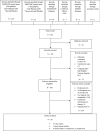Steroids for the treatment of viral encephalitis: a systematic literature review and meta-analysis
- PMID: 37060361
- PMCID: PMC10105360
- DOI: 10.1007/s00415-023-11715-0
Steroids for the treatment of viral encephalitis: a systematic literature review and meta-analysis
Abstract
Background: Specific antiviral treatment is only available for a small subset of viral encephalitis (VE). Adjunctive steroids are used, but there is scant evidence evaluating its utility. We present a systematic review and meta-analysis on the outcome of steroid use in VE.
Methods: We conducted a systematic literature review and reported it according to the Preferred Reporting Items for Systematic Reviews and Meta-Analyses (PRISMA) standards. Two observational studies from unpublished or partially published data were added. For the meta-analysis, we employed the metaphor package of the statistical software R-4.3.1.
Results: We screened 378 studies and included 50. 155 patients were added from the Houston and Linz cohorts. Individual data were available for 281 persons, 120 (43%) of whom received steroids. The most common pathogens were herpes simplex virus 1, West Nile virus, and measles. Study designs and patient outcomes were heterogeneous. Only three of the trials report an advantage of steroid therapy. Steroid-induced side effects were scarce. Ten cohorts were included into the meta-analysis. For the pooled data, the null hypothesis could not be rejected (p = 0.245) using a random effects model, i.e., a benefit of steroid treatment on survival in VE could not be shown.
Conclusions: Steroids as potent anti-inflammatory agents may act through a reduction of secondary inflammation-mediated damage. Our data do not support the use of steroids in VE. However, multiple shortcomings apply. Standardized controlled trials are needed to investigate optimal dosing and timing of steroid administration and to explore potential subgroups that could benefit.
Keywords: Infectious diseases; Intensive care; Neurovirology; Steroids.
© 2023. The Author(s).
Conflict of interest statement
None declared in relation to this study.
Figures



References
-
- Guyatt GH, Oxman AD, Vist GE, et al. GRADE: an emerging consensus on rating quality of evidence and strength of recommendations. BMJ. 2008;336:924–926. doi: 10.1136/bmj.39489.470347.AD. - DOI - PMC - PubMed
Publication types
MeSH terms
Substances
LinkOut - more resources
Full Text Sources

